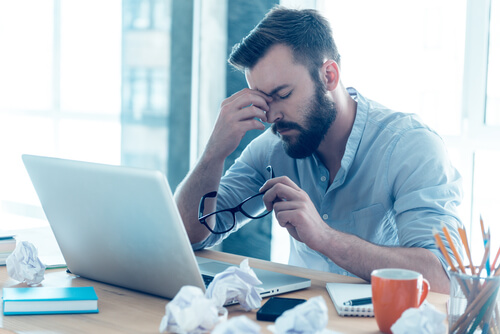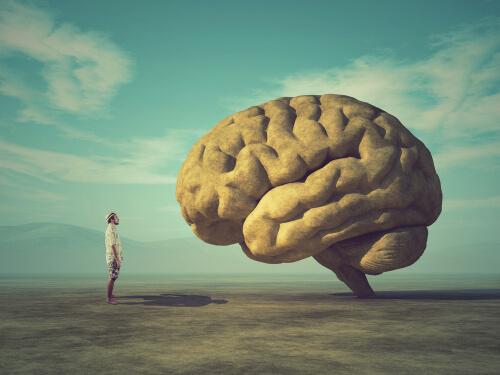Feeling Like You Can't Concentrate? Here's What You Can Do


Written and verified by the psychologist Valeria Sabater
Having a conversation, performing at work, making a simple decision. Sometimes, even the simplest things seem impossible. Indeed, the most common phrase heard these days is “I don’t know what’s wrong with me …I just can’t concentrate”. It seems as if, nowadays, many of us have the same level of attention as a goldfish. That’s eight seconds, by the way.
Is this normal? Are we experiencing some kind of universal problem? As a matter of fact, this phenomenon is really common, which is reassuring. Our lives are filled with fear, anguish, excess information, changes, and constant uncertainty. Unsurprisingly, our brains are unable to process so much stimulation, noise, and emotional ups and downs.
As it’s a recurring phenomenon, we need to learn how to control our focus and manage our attention a little better. That’s because a scattered mind that gradually becomes erratic eventually takes its toll on our well-being. Daniel Goleman explained in his book, Focus: The Hidden Driver of Excellence, that we’ve been neglecting the importance of attention for several decades. In fact, we forget that this psychological resource is essential for our performance in life.
Furthermore, it’s not only important in the workplace or school. Focusing improves our relationships and optimizes our opportunities to be happier and to remember what’s important and work on it.

The symptoms of being unable to concentrate
Some symptoms you may experience are:
- Inability to remember things that happened recently.
- Difficulty sitting still.
- Trouble thinking clearly.
- Frequently losing things or having trouble remembering where they are.
- Inability to make decisions.
- Inability to perform complicated tasks.
- Lack of concentration.
- Lack of physical or mental energy to concentrate.
- Making careless mistakes.
You may also have noticed that it’s sometimes more difficult to concentrate at certain times of the day or in specific environments. Others may comment that you seem distracted. You also might miss appointments or meetings due to a lack of concentration.
Why can’t you concentrate?
Concentration is the ability to focus our cognitive resources on tasks. We all have it to a greater or lesser extent. That said, you probably sometimes notice that you have trouble concentrating and forget things. Why does this happen? Let’s find out.
- You have a long list of tasks to do. The more things there are on your to-do list, the more difficult it is to focus on something in particular. However, if you start thinking about all the tasks that you have left to do, you won’t be able to pay attention to the ones that you should be doing at the moment.
- Your working day is extremely long. Working days of more than eight hours are counterproductive. That’s because they don’t leave time for your body and the brain to recover. If your mind is fatigued, your concentration will decrease.
- You get too little rest. According to research, a lack of rest can affect your attention and concentration due to increased sleep pressure.
- You’re not motivated. Having a job that you don’t like, doing activities that you don’t enjoy, not having a specific goal, or not receiving congratulations or thanks can be the cause of your concentration problems.
- You use technology a lot. All electronic devices, such as cell phones and computers are a great source of distraction. If you can’t live without social media, it’s probably hard for you to focus and keep your attention on specific tasks.
- You don’t exercise. A lack of physical activity could be related to your concentration problems since exercise affects mental abilities and memory. A study conducted with children suffering from ADHD suggests that exercise can be useful for learning since it provides greater impulse control and improves concentration.
- You’re really disorganized. If your desk is messy, dirty, or cluttered, it’ll be more difficult for you to concentrate. That’s because your mind is diverted by this and isn’t concentrating on what it should focus on.
- You suffer from anxiety. Anxiety is one of the main causes of inattention. Being worried about what’s going to happen in the future doesn’t allow you to focus on the present and enjoy it.
All of these factors can explain your lack of concentration. A lack of concentration is considered to be pathological when it influences different areas of your life, when it lasts for a period of more than six months, or when it occurs as a consequence of a mental disorder.
What can you do if you can’t concentrate?
Concentration is essential in your day-to-day life. Without it, your mind gets lost, wanders, and chooses to go where it shouldn’t. For instance, you might think about your worries or answer some of your cell phone messages. This tendency for your mind to wander and for you to lose focus often leads you into a vicious circle of frustration.
This low concentration slows your performance down. Seeing that you haven’t done what you wanted to and that you didn’t achieve your objectives for the day makes you anxious. Shortly after, your accumulation of emotions tends to further block your attention, and your ability to be productive. It’s like a one-way trip that makes you feel desperate and you end up in a state that you don’t really know how to handle.
When you can’t concentrate, it’s really common to wonder what’s wrong with you. If you want an answer you must first understand how human attention works.
Your level of concentration is always low
There’s no consensus among scientists on how long sustained attention lasts. In fact, the data is almost always disparate. For instance, the psychologists, Wilson and Korn (2007) found no conclusive data but stipulated that, despite the existence of individual differences, it’s generally low.
A study conducted in 2015 by Microsoft Canada stipulated that the average attention span is 12 seconds.
Despite the lack of consensus, one thing is clear: we have such a hard time concentrating that many education experts insist that the 50-minute class model doesn’t work.
The brain rarely sustains attention for more than 15 minutes at a time.

The context around you further reduces your attention span
Starting from the basis that your ability to focus is (on average) low, to this must be added another factor: the context that surrounds you.
- Social, economic, and cultural challenges can take their toll on you. Whether consciously or unconsciously, many of these elements are constantly in your brain, consuming its attention and energy.
- The level of anxiety among the population, in general, has increased in recent years. One of the characteristics of the anxious brain is the inability to pay attention, solve problems, or make decisions.
- Your environment is now filled with many more stimuli as a result of technological progress. For instance, the levels of news have risen with which you consult your cell phone more frequently. You also receive more messages from your environment.
- Your mind also wanders like never before. You think about the present and the future. You ask yourself questions and imagine troubling scenarios and situations. In fact, you’re taken over by worry.
If you can’t concentrate… what strategies should you employ?
“I can’t concentrate, I don’t know what to do, it’s really hard for me to perform at work. I can’t even have a conversation”. Today, these words are heard increasingly frequently. It’s perfectly normal as there are so many surrounding pressures. However, you need to take control and educate your mind to regain focus. Here are some strategies.
- Divide your time into 30 minutes segments. If you have to work or perform tasks, do them in half-hour intervals. At the end, of each 30 minutes, give yourself a short break. The important thing is to be aware that, during those times, you must perform at your best.
- Do one thing at a time and deal with one thought at a time. If you want to increase your mental well-being, visualize your mind as if it were a house. Only accept single visits. In other words, don’t allow more than one concern inside your mind at the same time. The same goes for the tasks you have to perform. Avoid doing many things at once. If you focus on just one, your performance will improve.
- Hygiene and emotional self-care. When times are tough, try and calm down. When you’re faced with a lot of stimuli, balance yourself. Also, when everything becomes too much for you, practice emotional self-care. Take care of your internal world and handle every emotion and sensation. Your ability to concentrate will improve if you manage to regulate your inner universe.
To conclude, nothing is as common right now as feeling like you can’t concentrate. Your brain is aware of a world with greater complexity and new challenges. Train your focus by regulating your emotions first. Gradually, you’ll regain control. It’s worth thinking about.
All cited sources were thoroughly reviewed by our team to ensure their quality, reliability, currency, and validity. The bibliography of this article was considered reliable and of academic or scientific accuracy.
- Goleman, Daniel (2013) Focus. Kairós.
- Krause, A. J., Simon, E. B., Mander, B. A., Greer, S. M., Saletin, J. M., Goldstein-Piekarski, A. N., & Walker, M. P. (2017). The sleep-deprived human brain. Nature Reviews Neuroscience, 18(7), 404-418.
- Sierra, J. C., Ortega, V., & Zubeidat, I. (2003). Ansiedad, angustia y estrés: tres conceptos a diferenciar. Revista mal-estar e subjetividade, 3(1), 10-59.
- Silva, A. P., Prado, S. O., Scardovelli, T. A., Boschi, S. R., Campos, L. C., & Frere, A. F. (2015). Measurement of the effect of physical exercise on the concentration of individuals with ADHD. PloS one, 10(3), e0122119.
This text is provided for informational purposes only and does not replace consultation with a professional. If in doubt, consult your specialist.








